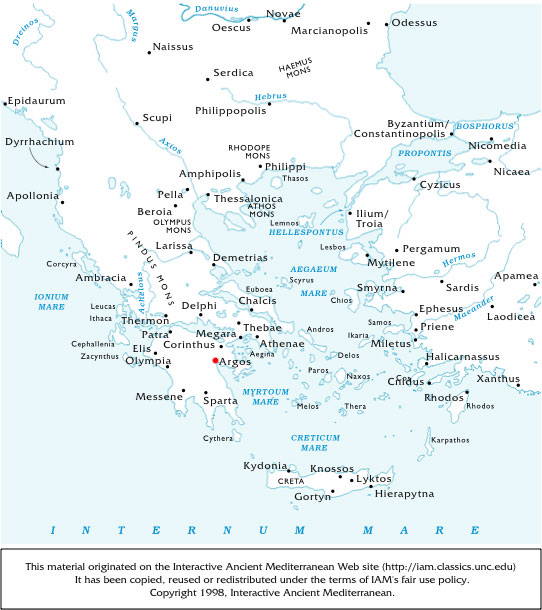
Argos
The name Argos (adjectival form Argive) apparently signified an agricultural plain and was applied to several districts in ancient Greece. Historically, the Argolis was the easternmost portion of the Peloponnesian peninsula, and the city of Argos was its capital. Agamemnon, Diomedes, and other heroes from Argolis' fertile plain figure prominently in the Iliad of Homer. The present town of Argos lies about 4 miles (6.5 km) from the gulf below Kástro hill (ancient Larissa), a site probably occupied since the Early Bronze Age and very prominent in Mycenaean times (c. 1300-1200 BC). A small market town on the Corinth-Navplion rail line, it is built over much of the site of the classical city.
Argos was probably the base of Dorian operations in the Peloponnese (c. 1100-1000 BC), and from that time onward it was the dominant city-state of Argolis. Under the Argive king Pheidon (7th century BC), Argos was the dominant city-state in all the Peloponnese until the rise of Spartan power. The Argives defeated the Spartans at Hysiae (669). In 550 and again in 494, however, Sparta defeated Argos, which took no part in the Greco-Persian Wars. As Spartan power continued to grow, Argos allied with Athens in 461 and again during the Peloponnesian War in 420, but, after the defeat of the Athenian League in 418 and an oligarchic revolution in Argos, the city allied itself with Sparta. Peace with Sparta was broken when Argos united federally with Corinth (392) as the Corinthian War started. Argive loyalty to Corinth soon wavered, and, when Thebes revolted against Sparta (379), democrats took power in Argos and participated in Theban victories over Sparta at Leuctra (371) and Mantineia (362).
Waning Theban power brought renewed Spartan aggression that forced the Argives to appeal to Philip II of Macedonia, who restored to them their old province of Cynuria on the western side of the Gulf of Argolis. After several more incursions, principally Macedonian, into its territory, Argos joined the Achaean League in 229, remaining active except during brief Spartan occupations of the city (225 and 196).
The Roman conquest and the destruction of Corinth (146) increased the importance of Argos, which became the centre of the Achaean League. The city flourished in Byzantine times, but when the Frankish principality of Achaea was established (AD 1204) after the Fourth Crusade with Nauplia as its capital, Argos consequently declined. In 1397 the Turks captured Argos, and again in 1500, massacring the inhabitants and replacing them with Albanians. During the War of Greek Independence (1821-29), the first free Greek Parliament was convened at Argos (1821 and 1829). (Encyclopaedia Britannica Online.)
